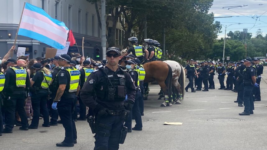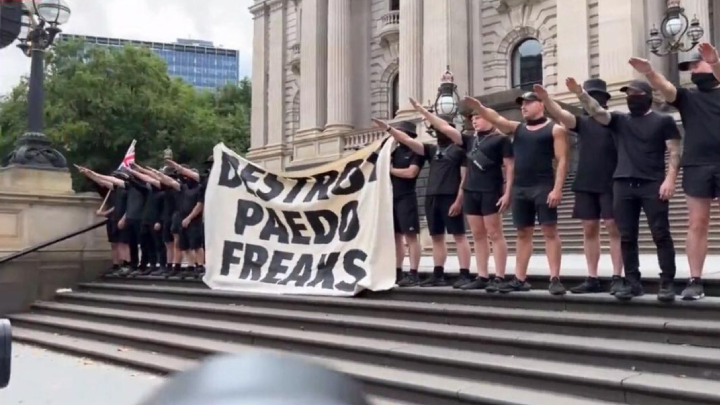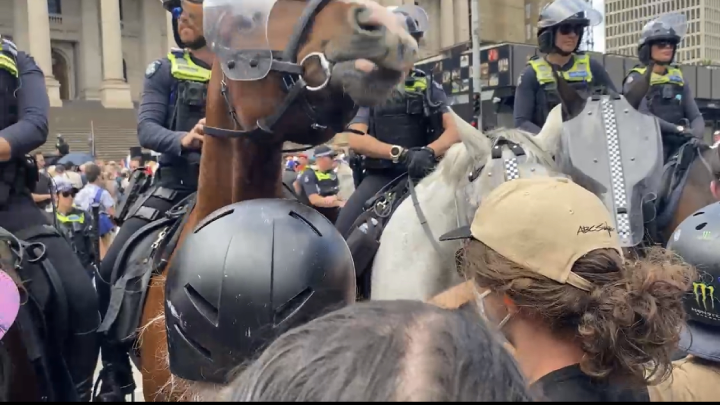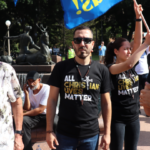Victorian Policing of Opposing Protests Was Biased in Favour of Nazis, Legal Group Observes

As UK anti-transgender figure Kellie-Jay Keen was about to stage one of her divisive Let Women Speak events before Victorian parliament in Melbourne on 18 March, about 30 members of the National Socialist Network, the nation’s most prominent neo-Nazi group, mobilised in her support.
At each of her events during her Australian tour, Keen, also known as Posie Parker, has been met by counterprotests, consisting of pro-trans rights advocates and antifascists. And this trend was apparently the reason why Melbourne’s most notorious neo-Nazis were in attendance.
In dealing with the opposing protest actions, Victoria police officers formed a reinforced line to hold back the transgender protesters and their allies, which then permitted the neo-Nazis to march along the street, signalling the Nazi salute, while Keen and others gave prejudicial speeches.
Melbourne Activist Legal Support (MALS) had seven trained legal observers on the ground. And it’s released a statement of concern in relation to the way local law enforcement policed the event, as it failed to uphold “it’s numerous obligations to prevent discriminatory or prejudice-motivated acts”.

Prejudicial policing
MALS outlined in its statement that two differing trans rights protests, one run by the Campaign Against Fascism and Racism and the other by Trans Queer Solidarity Naarm, mobilised in separate positions on the day, and legal observers were positioned at each of these rallies.
The activist legal support organisation listed seven main areas of concern in relation to the actions of Victoria police.
The first issue it identified was the biased and discriminatory approach taken by police officers in terms of crowd management.
Police commanders and Public Order Response Team (PORT) tactical advisors targeted only the pro-trans activists, who were cordoned off. And this allowed the opposing far right groups to openly spout hate speech and partake in prejudicial actions aimed at trans and gender diverse people.
“It is MALS’ view that the vastly different approaches to the two opposing groups and the resulting harms, arrests, use of force, and the failure to act upon any of the hate-motivated messages and behaviour on display formed a clear pattern of biased and discriminatory policing,” the report reads.
MALS considers that Victoria police breached its obligations set out in section 16 of the Charter of Human Rights and Responsibilities Act 2006 (Vic), in conjunction with those contained in article 21 of the International Covenant on Civil and Political Rights (ICCPR).
Further issues included officers using excessive force, the aggressive containment of the crowd being dangerous, that there was improper use of OC spray, that legal observers were shoved by police and that the use of horse by mounted officers was problematic.
The last identified issue relating to the policing of the demonstrations was that the Victoria police LGBTIQ+ liaison officers (LLOs) present were either wearing plain clothes or were indistinguishable from other uniformed officers, which meant protesters couldn’t identify them.
Police told MALS observers that protesters could ask individual officers whether they were an LLO. But the legal group claims that with the “displays of hatred… and heavy and aggressive policing, the suggestion that people go to individual officers until they find an LLO is obviously unrealistic”.

Making police accountable
In light of the evidence provided, MALS made several recommendations on how Victoria police could improve its tactics moving into the future.
MALS firstly considers that the Independent Broad-based Anti-Corruption Commission (IBAC) and the Victoria Equal Opportunity and Human Rights Commission (VEOHRC) be charged with investigating the events and that the latter organisation reviews the Victoria Police Manual.
Other suggestions include restricting mounted police to ceremonial or patrolling duties, that OC spray no longer be used on peaceful protesters, that LLOs be clearly identifiable and that legal observers are included in crowd control guidelines, so that officers ensure their safety at events.
“MALS observed that the policing itself constituted biased and discriminatory actions on the part of Victoria police,” the statement reads, adding that other areas of concern involved “the misuse of oleoresin capsicum spray, incidents of excessive force, and mistreatment of legal observers”.







